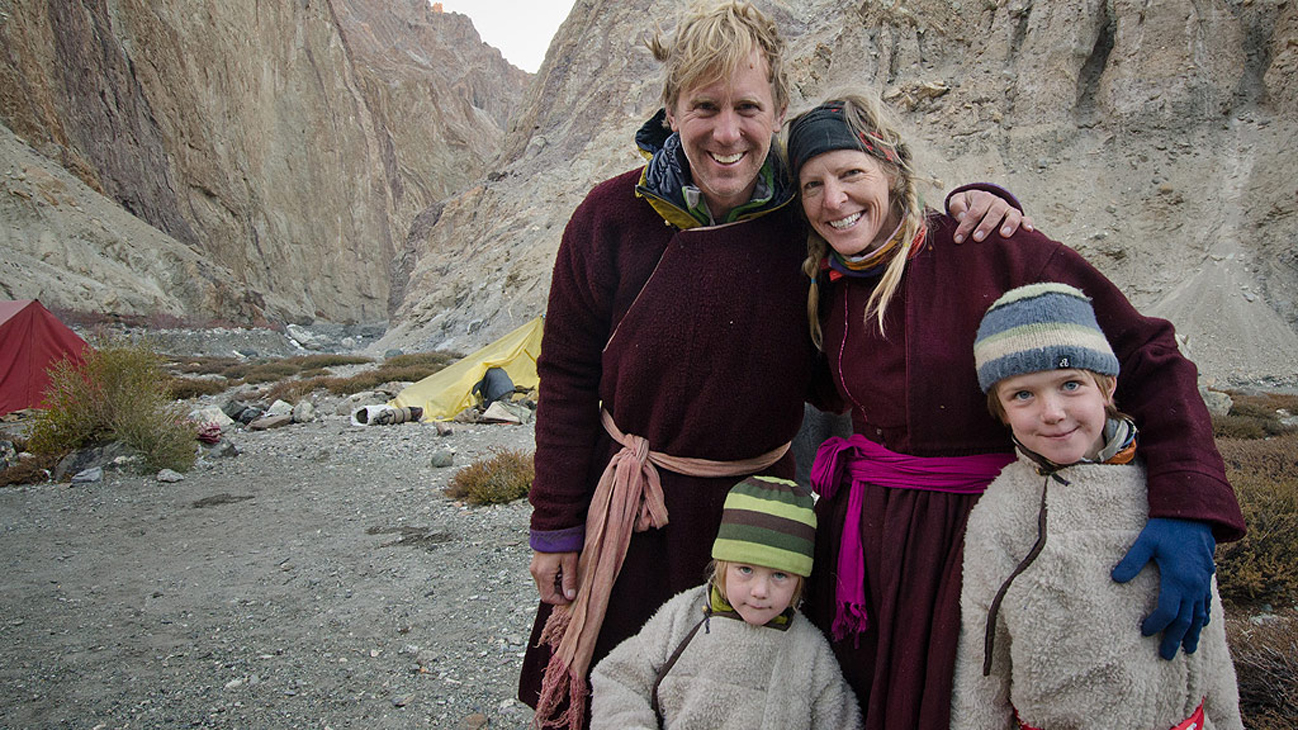Last year, award-winning explorer, writer, and photographer Bruce Kirkby traveled halfway around the world with his wife and their two young sons to live in a cliff-side Buddhist monastery in the lost Himalayan Kingdom of Zanskar. A nine-episode series about their journey—Big Crazy Family Adventure—premieres on Travel Channel Sunday, June 21 at 9pm. Bruce recently wrote about the experience in Men’s Journal:
For more than a decade, I’d ignored the symptoms. A tidal wave of technology (tweets, emails, phones, online bills, etc) that was supposed to make life easier, had instead made me cripplingly busy, and was distracting me from the stuff that actually mattered. Instead of climbing mountains and writing books , I was reinstalling operating systems and answering emails of people I didn’t even know. Then kids came along, with their relentless way of illuminating the obvious.
But what to do? My wife once studied Buddhism and hoped to expose our children to its teachings. I love big mountains and longed to once again trek and climb in the company of Sherpa. We both felt at home in the Himalaya. So we searched for a monastery hidden in the deepest reaches of that great range, insulated from the modern world by geographic and political barriers. Then — before ‘someday’ never came — we packed our bags and left.
Moments before walking out the door of our British Columbia home, I turned my phone off and tossed it in a drawer. Anyone sending an email in the next six months would get an autoreply: Home in November. Sorry for the inconvenience.
We feel airplanes diminish not only time and distance, but everything that lies in between (language, culture, landscapes), so instead of flying to the other side of the world, we set out overland, paddling canoes down the Columbia River to the trans-Canadian railway, where we stashed the boats and flagged a train to the coast. From Vancouver, a 77,000-ton container ship carried us across the North Pacific to the busy ports of Asia.
A combination of bullet-trains, tuk-tuks, riverboats, taxis, and overnight ferries led us across Korea, into China, over the Tibetan Plateau, into the jungles of Nepal, to the plains of India, down the Ganges River, and finally up into the Himalayan foothills. A bouncy jeep carried us to the end of the road, where we loaded a team of donkeys and began a twelve-day trek over the Great Himalayan Range. Our destination: India’s remote Zanskar Valley, and a thousand-year old Buddhist monastery. One hundred days after leaving Canada, Karsha Gonpa came into view, a warren of whitewashed buildings plastered on cliffs steeper than any black diamond ski run.
For three months, the four of us lived in an 8′ x 8′ earthen room, without electricity, running water, or flush toilets. Taken in by the Head Lama, we were part of a living, breathing Buddhist community; eating from wooden bowls in a cement courtyard, planting, tending, and harvesting crops, teaching English and Mathematics to attention-starved novice monks who became our boys constant companions.
Every morning, called by blaring brass horns, we joined the other monks in a dark Assembly Hall for ‘puja,’ a multi-hour meditative prayer session dominated by chanting and enlivened by the frequent serving of salty butter tea and raw barely flour. While our boys played with LEGO, we sat cross-legged — and did nothing. “Try closing your eyes and focusing on your breathing,” my wife whispered.
As the days turned to weeks, and then months, and I sat unusually still, something began to happen. My brain slowed down, and soon I realized I was as happy and peaceful as I can ever remember.
We left as the first winter storms threatened to close the high passes. And with every step towards home, I felt that peace slipping away. In New Delhi, we stayed at an opulent colonial hotel, of marble halls and shaded lawns. After three months of simple village life, what struck me like a punch was how desperately unhappy every single person at that fine establishment looked, bewildered foreigners and rich Indians alike.
Back at home I settled down to write a book, but distractions quickly overwhelmed me. I hadn’t expected it to be so difficult. I wrote two books a decade ago, but we live in a different world today. Every computer is connected to the Internet, and every pocket holds a phone. While responding to all those little beeps and whistles made me feel productive, I quickly realized it wasn’t. Creating space to get actual work done — the big stuff, things that matter, not the little stuff — now requires strategic effort. I unplugged my computer from the Internet and left my phone at home. And the guy who once would have rather gone for a morning run instead began meditating for ten minutes at dawn. And it felt bloody good.

